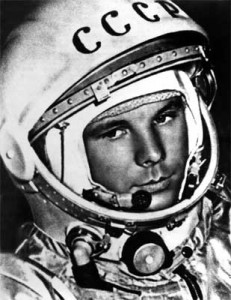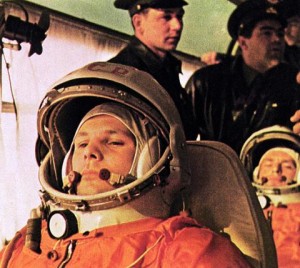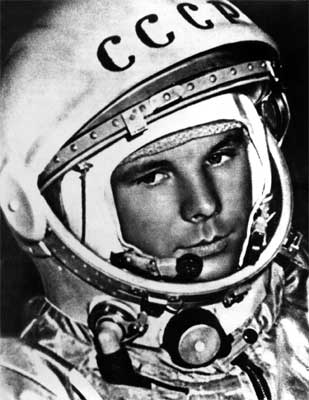April 12
The Motherland hears, the Motherland knows
Where her son flies in the sky—Russian song whistled by Yuri Gagarin during the first manned space flight

For thousands of years, humans stared at the skies wondering about the composition of the stars, lights that shined through pinpoints in the banner of heaven. It took millennia for our knowledge of the skies to coalesce. And it wasn’t until 1903 that Wilber and Orville Wright appeared to have conquered gravity, albeit briefly.
Yet only six decades after that first flight, a human being transcended into outer space. That man was Yuri Gagarin. The day was April 12, 1961—now celebrated as Cosmonaut’s Day.
The 27 year-old Russian pilot stood only 5’2″, an advantage for the world’s first cosmonaut, crammed into the tiny cockpit of the spacecraft Vostok 3KA. The Vostok launched from Baykonur, Kazakhstan, at 9:07 am Moscow Time. The flight lasted only 108 minutes, but in that time Yuri Gagarin circled the globe, a feat that had taken Magellan’s crew three years.
As late as early April there had been six contenders for the first cosmonaut. Gagarin wasn’t finalized as the pilot of the craft until just two days before the flight. And if some officials had their way, we would be celebrating “Herman’s Night” today instead of “Yuri’s Night.” Herman Titov was Yuri’s backup.

According to Gagarin, the flight went mostly smoothly. He didn’t report an emergency during the mission, but:
“As soon as TDU (breaking engine) shot down, there was a sharp jolt. The spacecraft started spinning about its axis with a very high speed…Everything was spinning. One moment I see Africa — it happened over Africa — another the horizon, another the sky. I barely had time to shade myself from the sun, so the light did not blind my eyes.”
The 20th century Icarus faired better than his Greek predecessor. Gagarin ejected from the crafted at 10:44 am and landed safely.
His post-flight report wasn’t published until decades after the flight.
By beating the first American into space (Alan Shepard) by one month, Gagarin helped the Soviet Union emerge as the apparent leader in aeronautic technology, and the space race was on. Yuri went from complete obscurity to a national hero—perhaps THE national hero for two generations of Russians.
Gagarin legacy far outlasted his life. He died in 1968 in a training flight crash. He was only 34 years old.
Cosmonautics Day was established by the Soviet Union in 1962. Today April 12 is also known as Yuri’s Night, celebrated around the world in honor of the 5’2″ giant who first touched the heavens.


